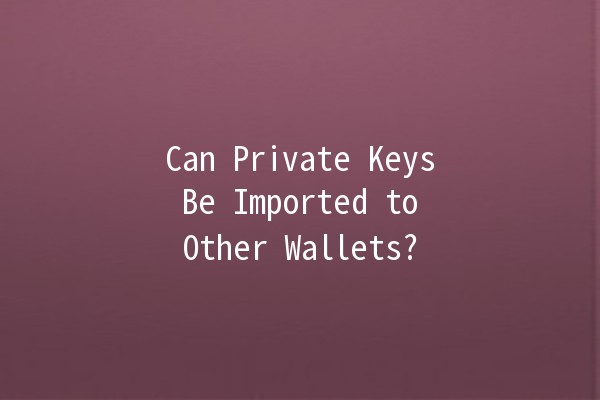
When diving into the world of cryptocurrencies, understanding how wallets operate is fundamental. One crucial component of wallets is the private key, a secret number that grants you access to your cryptocurrency. This article will explore whether private keys can be imported into other wallets and provide practical tips on managing keys and wallets safely.
Understanding Private Keys
A private key is essentially a long string of alphanumeric characters that acts like a password for your cryptocurrency. It is crucial for signing transactions and accessing your cryptocurrency. If someone else gains access to your private key, they can control your funds, which is why it's essential to keep it secure.

When you create a wallet, that wallet generates a private key (or keys) associated with it. You can think of your wallet as a bank, and the private key as your account number and password combined into one.
Can You Import Private Keys into Other Wallets?
The short answer is yes; you can import private keys into other wallets, but there are a few conditions:
Benefits of Importing Private Keys
Risks of Importing Private Keys
Practical Tips for Managing Private Keys
Explanation: Hardware wallets store your private keys offline, providing a much more secure environment against hacks compared to online wallets.
Example: Devices like Ledger or Trezor allow you to store your private keys securely while enabling you to interact with various blockchain networks.
Explanation: Backing up your wallet, including your private key, ensures that you can recover your assets in case of device failure.
Example: Keep a physical copy of your seed phrase or private key in a safe place, away from electronic devices.
Explanation: Knowing the differences between hot wallets (connected to the internet) and cold wallets (offline storage) can help you make informed decisions about where to store your funds.
Example: Use a cold wallet for large amounts of cryptocurrency and a hot wallet for smaller amounts needed for transactions.
Explanation: Familiarizing yourself with best practices for cryptocurrency security can dramatically reduce the risk of theft.
Example: Learn about phishing tactics, common scams, and secure practices like twofactor authentication.
Explanation: Regular software updates can patch vulnerabilities and make your wallet safer.
Example: Ensure that your wallet software is always up to date, as developers frequently release security fixes.
Common Questions About Importing Private Keys
When you import a private key into a new wallet, you gain access to the funds associated with that key. Your coins are still on the blockchain, but now they are accessible via the new wallet interface.
No, you might only import private keys from wallets that support the same cryptocurrency. Ensure that the receiving wallet is compatible with the token associated with your private key.
While it can be safe if done correctly, ensure that you're using a reputable wallet. Avoid importing private keys into untrusted wallets, as this could expose your assets to risks.
If your private key is compromised, immediately transfer your funds to a new wallet with a new key. It's vital to act quickly to minimize potential losses.
Technically, yes, multiple wallets can use the same private key, but it can lead to complications like syncing issues. It’s generally recommended to avoid using the same private key across multiple wallets.
Utilize hardware wallets, enable twofactor authentication, and regularly change passwords. Always back up your keys in a secure manner to prevent loss.
The ability to import private keys to other wallets can be useful for managing and securing your cryptocurrency assets. Understanding the implications, risks, and best practices surrounding private key management is crucial for every cryptocurrency user. Taking proactive steps can significantly enhance your security and accessibility, ultimately contributing to a safer crypto journey.

